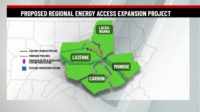Construction corporate, union and trade group executives are among 200 business chiefs President Donald Trump hosted on April 15 for the first meeting of advisory groups quickly assembled to advise his plan to restart the COVID-19 stalled U.S. economy, which he targets for May 1.
But on April 16 and just before—with testing shortfalls and cases high—governors in New York, Maine, Vermont, Delaware and other states, and Washington D.C. officials said that non-essential work shutdowns now will extend to May 15, with some even farther.
Shutdowns in Virginia now will reach to June 10 and those in Maryland, California and elsewhere remain indefinite. The three western coastal states, and separately, seven northeastern states, and a bipartisan group of seven midwestern states have agreed to joint pacts on when to open their economies.
Social Distance Guidance Released
The administration on April 16 released new guidance to states on social distance easing, that include phased-in reopening based on degree of transmission severity in areas.
Some social distance mandates may have to remain in place through year end to prevent a new outbreak, while others "could see a resumption in normal commerce and social gatherings after a month of evaluating whether the easing of restrictions leads to a resurgence in virus cases," says the Associated Press.
[For ENR’s latest coverage of the impacts of the COVID-19 pandemic, click here]
In a briefing to U.S. governors, Trump said they would be responsible for deciding when to lift restrictions in their states, telling them “You’re going to call your own shots,” AP reported.
Executives tapped for the 17 administration industry groups, part of its April 14-announced "Great American Economic Revival," will work with government in response to the pandemic's financial impact "to chart the path forward toward a future of unparalleled American prosperity," said a White House statement.
The groups are described as "bipartisan," but, according to the New York Times, include a number of Trump financial backers and supporters.
The White House was not immediately available for further comment on April 14 on group mission and work products, which were not described, with groups termed by one official in an NBC report, "the beginning of a dialogue."
Construction Advisers Identified
Members of the industry-related group, dubbed "construction/labor/workforce," include CEOs of Fluor Corp. and Bechtel, chiefs of five unions and labor councils, and heads of six major industry lobby groups.
The White House list of all group members excluded titles. See the augmented list of construction appointees below.
Also in this group is Los Angeles real estate developer Geoffrey Palmer, who has made a $2-million donation to the Trump re-election campaign, the Washington Post reports, citing federal filings made public on April 15. A separate group of executives under the real estate category also includes CEOs of developers The Related Group, Vornado Realty Trust, Simon Property Group and Starwood Capital Group.
Among other groups formed include leaders in energy, transportation, telecommunications, defense contracting, manufacturing and retail.
Linda Bauer Darr, president and CEO of the American Council of Engineering Cos. (ACEC), which represents at least 5,300 design-related firms, participated in the meeting and said a plan to emerge from the coronavirus pandemic is needed.
“It will be critical for the president and Congress to agree on an infrastructure stimulus that will create jobs through sustained, predictive, long-term investment,” she said in a statement.
ABC's Bellaman: Employee Retention is Key
Michael D. Bellaman, Associated Builders and Contractors president and CEO who is another named advisor, said employee retention is key to maintaining its supply chain and points to the U.S. Small Business Administration's Paycheck Protection Program, a loan that allows small businesses to keep workers on payroll.
He said “another strategy discussed was enactment of a substantial infrastructure package," but ENR reports that such a stimuls has moved to the "back burner" of federal priority.
ABC said establishing new best practices to follow Centers for Disease Control and Prevention (CDC) and local health standards, including efficient testing, are essential for a healthy workforce to deliver projects temporarily shut down due to COVID-19, a sentiment it claims was echoed on the call with Trump.
James P. Hoffa, general president of the Teamsters union, shared its top three priorities, which include all-worker access to PPE, sanitizer and a disinfected workplace; access to reliable testing; and U.S. Occupational Safety and Health Administration (OSHA) standards to hold “bad actor employers” accountable.
"Until we can ensure worker safety, we cannot put our members and workers at further risk by opening the economy up too soon,” said Hoffa in a statement, contending that 1 million Teamsters are currently working as essential.
The construction/labor/workforce members are:
- Linda Bauer Darr, president and CEO, American Council of Engineering Cos.
- Jim Callahan, general president, International Union of Operating Engineers
- Sean McGarvey, president, North America’s Building Trades Union
- Terry O’Sullivan, general president, Laborers’ International Union of North America
- James P. Hoffa, general president, International Brotherhood of Teamsters
- David Long, CEO, National Electrical Contractors Association
- Brendan Bechtel, chairman and CEO, Bechtel
- Carlos Hernandez, CEO, Fluor Corp.
- Jerry Howard, CEO, National Association of Home Builders
- Michael Bellaman, president and CEO, Associated Builders and Contractors
- Stephen Sandherr, CEO, Associated General Contractors of America
- Richard Trumka, president, AFL-CIO
- Geoffrey Palmer, owner, GH Palmer & Associates







Post a comment to this article
Report Abusive Comment